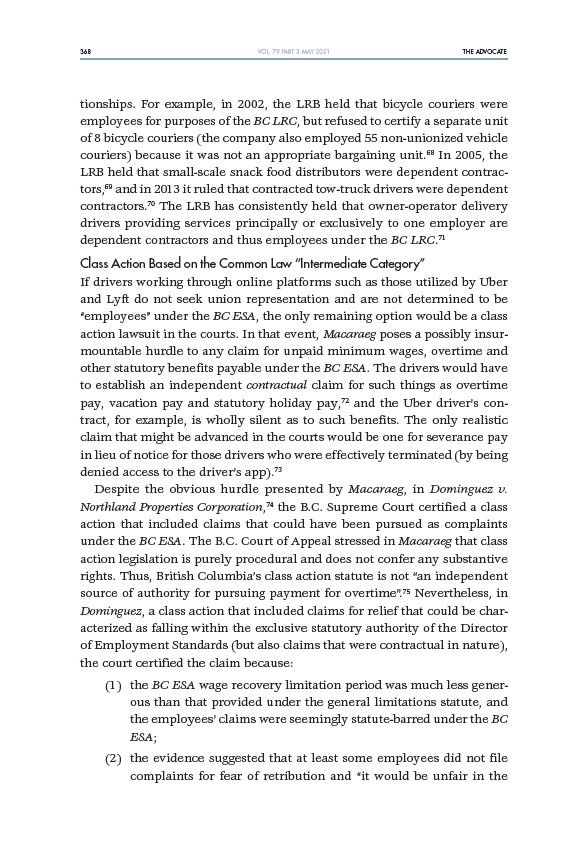
368 THE ADVOCATE
VOL. 79 PART 3 MAY 2021
tionships. For example, in 2002, the LRB held that bicycle couriers were
employees for purposes of the BC LRC, but refused to certify a separate unit
of 8 bicycle couriers (the company also employed 55 non-unionized vehicle
couriers) because it was not an appropriate bargaining unit.68 In 2005, the
LRB held that small-scale snack food distributors were dependent contractors,
69 and in 2013 it ruled that contracted tow-truck drivers were dependent
contractors.70 The LRB has consistently held that owner-operator delivery
drivers providing services principally or exclusively to one employer are
dependent contractors and thus employees under the BC LRC.71
Class Action Based on the Common Law “Intermediate Category”
If drivers working through online platforms such as those utilized by Uber
and Lyft do not seek union representation and are not determined to be
“employees” under the BC ESA, the only remaining option would be a class
action lawsuit in the courts. In that event, Macaraeg poses a possibly insurmountable
hurdle to any claim for unpaid minimum wages, overtime and
other statutory benefits payable under the BC ESA. The drivers would have
to establish an independent contractual claim for such things as overtime
pay, vacation pay and statutory holiday pay,72 and the Uber driver’s contract,
for example, is wholly silent as to such benefits. The only realistic
claim that might be advanced in the courts would be one for severance pay
in lieu of notice for those drivers who were effectively terminated (by being
denied access to the driver’s app).73
Despite the obvious hurdle presented by Macaraeg, in Dominguez v.
Northland Properties Corporation,74 the B.C. Supreme Court certified a class
action that included claims that could have been pursued as complaints
under the BC ESA. The B.C. Court of Appeal stressed in Macaraeg that class
action legislation is purely procedural and does not confer any substantive
rights. Thus, British Columbia’s class action statute is not “an independent
source of authority for pursuing payment for overtime”.75 Nevertheless, in
Dominguez, a class action that included claims for relief that could be characterized
as falling within the exclusive statutory authority of the Director
of Employment Standards (but also claims that were contractual in nature),
the court certified the claim because:
(1) the BC ESA wage recovery limitation period was much less generous
than that provided under the general limitations statute, and
the employees’ claims were seemingly statute-barred under the BC
ESA;
(2) the evidence suggested that at least some employees did not file
complaints for fear of retribution and “it would be unfair in the